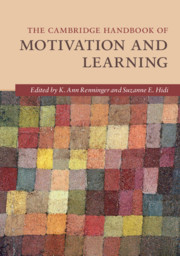Crossref Citations
This Book has been
cited by the following publications. This list is generated based on data provided by Crossref.
Kaisheva, Emiliya Mihaylova
Radoynova, Dobrinka
and
Zayakova, Yolanda
2018.
Possibilities for more accurate prediction of thermal injury severity and determination of its impact on the body using the Abbreviated Burn Severity Index.
Scripta Scientifica Medica,
Vol. 50,
Issue. 3,
p.
20.
Azevedo, Roger
2020.
Reflections on the field of metacognition: issues, challenges, and opportunities.
Metacognition and Learning,
Vol. 15,
Issue. 2,
p.
91.
Habig, Bobby
and
Gupta, Preeti
2021.
Authentic STEM research, practices of science, and interest development in an informal science education program.
International Journal of STEM Education,
Vol. 8,
Issue. 1,
Lahti, Henri
Lyyra, Nelli
Hietajärvi, Lauri
Villberg, Jari
and
Paakkari, Leena
2021.
Profiles of Internet Use and Health in Adolescence: A Person-Oriented Approach.
International Journal of Environmental Research and Public Health,
Vol. 18,
Issue. 13,
p.
6972.
Shimizu, Yuno
2022.
The Content Specificity and Generality of the Relationship between Mathematical Problem Solving and Affective Factors.
Psych,
Vol. 4,
Issue. 3,
p.
574.
Bühler, Michael Max
Jelinek, Thorsten
and
Nübel, Konrad
2022.
Training and Preparing Tomorrow’s Workforce for the Fourth Industrial Revolution.
Education Sciences,
Vol. 12,
Issue. 11,
p.
782.
Azevedo, Roger
Bouchet, François
Duffy, Melissa
Harley, Jason
Taub, Michelle
Trevors, Gregory
Cloude, Elizabeth
Dever, Daryn
Wiedbusch, Megan
Wortha, Franz
and
Cerezo, Rebeca
2022.
Lessons Learned and Future Directions of MetaTutor: Leveraging Multichannel Data to Scaffold Self-Regulated Learning With an Intelligent Tutoring System.
Frontiers in Psychology,
Vol. 13,
Issue. ,
Bourgeois, Amanda
Carroll, Annemaree
and
Bower, Julie
2022.
Exploring the emotions of disadvantaged adolescents in the classroom: Development of the S2* emotion application.
Frontiers in Education,
Vol. 7,
Issue. ,
A. Fredricks, Jennifer
2022.
Handbook of Research on Student Engagement.
p.
617.
Johansson, Jonas Erik
2022.
Elevperspektiv på vad som väcker intresse för litteraturhistoria.
Educare,
p.
98.
Michaelis, Joseph E.
and
Weintrop, David
2022.
Interest Development Theory in Computing Education: A Framework and Toolkit for Researchers and Designers.
ACM Transactions on Computing Education,
Vol. 22,
Issue. 4,
p.
1.
Kera, Masaki
2023.
The Transmission of Implicit Theories of Intelligence (ITI) between Parents and Children: Focusing the Degree of Agreement in ITI between the Parents.
The Japanese Journal of Personality,
Vol. 32,
Issue. 1,
p.
24.
Winne, Philip H.
2023.
Unobtrusive Observations of Learning in Digital Environments.
p.
175.
Zhang, Fa
Bae, Christine L.
Broda, Michael D.
and
Koenka, Alison C.
2023.
Factor Structure of Student Science-Learning Motivation: Evidence from TIMSS U.S. Data.
Sustainability,
Vol. 15,
Issue. 17,
p.
13230.
Putwain, David William
and
Daumiller, Martin
2023.
A Network Analysis of Control–Value Appraisals and Classroom-Related Enjoyment, Boredom, and Pride.
Education Sciences,
Vol. 13,
Issue. 3,
p.
239.
Tiede, Jennifer
Grafe, Silke
and
Mangina, Eleni
2023.
Student Motivation in Augmented Reality-Enhanced Gamified STEM Learning Settings.
p.
1.
BAKIR, Nur Şebnem
and
GÜLŞEN TURGUT, İlknur
2023.
A Research on Mathematical Epistemological Beliefs and Mathematics Motivation of High School Students.
Acta Didactica Napocensia,
Vol. 16,
Issue. 1,
p.
196.
Crippen, Matthew
2023.
Chinese Thought and Transcendentalism: Ecology, Place and Conservative Radicalism.
Religions,
Vol. 14,
Issue. 5,
p.
570.
Siew, Nyet Moi
and
Ahmad, Jamilah
2023.
THE EFFECTS OF SOCIOSCIENTIFIC ISSUES WITH THINKING WHEEL MAP APPROACH ON CURIOSITY TOWARDS STEM OF YEAR FIVE STUDENTS.
Problems of Education in the 21st Century,
Vol. 81,
Issue. 1,
p.
130.
Li, Hailing
and
Cheong, Jadeera Phaik Geok
2023.
Using the ADDIE model to design and develop physical education lessons incorporated with a functional training component.
Frontiers in Public Health,
Vol. 11,
Issue. ,



